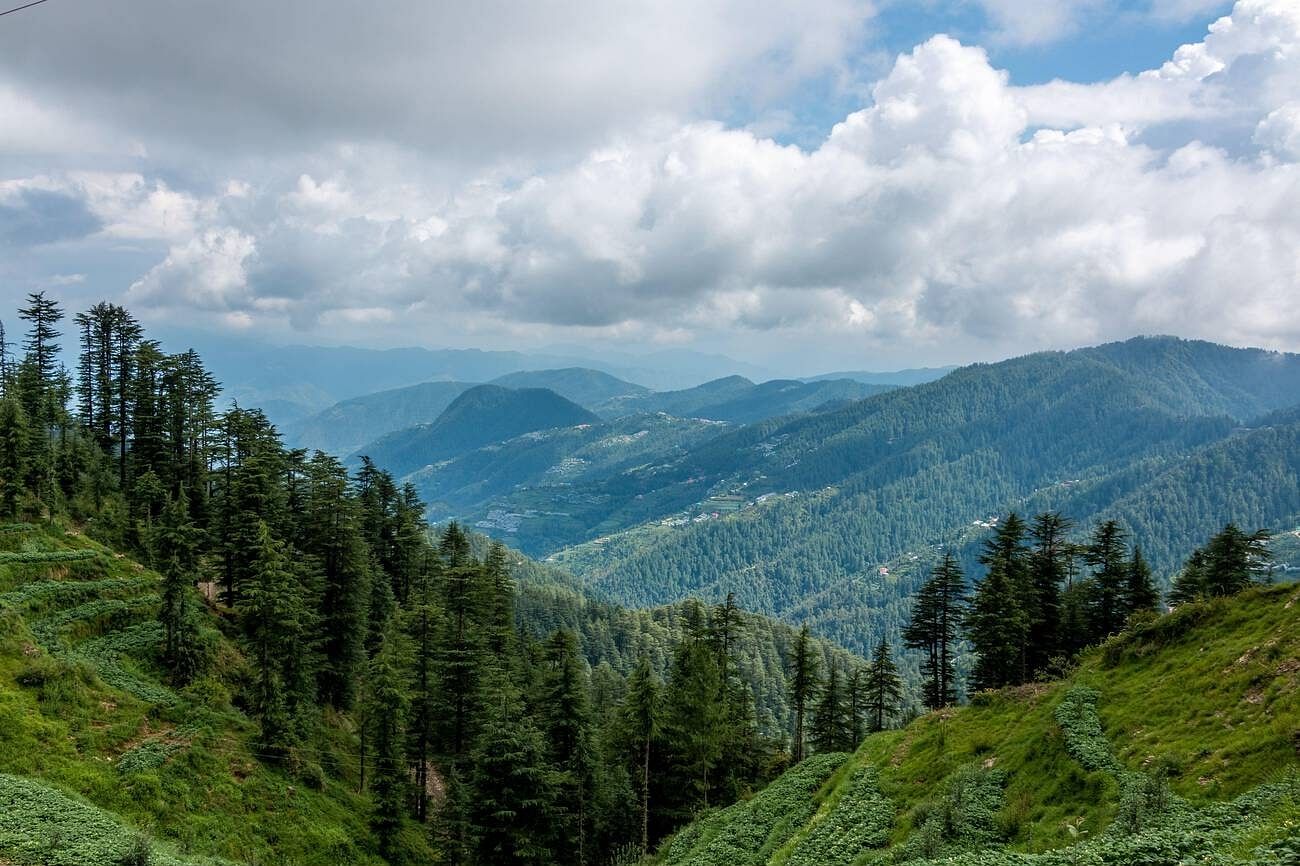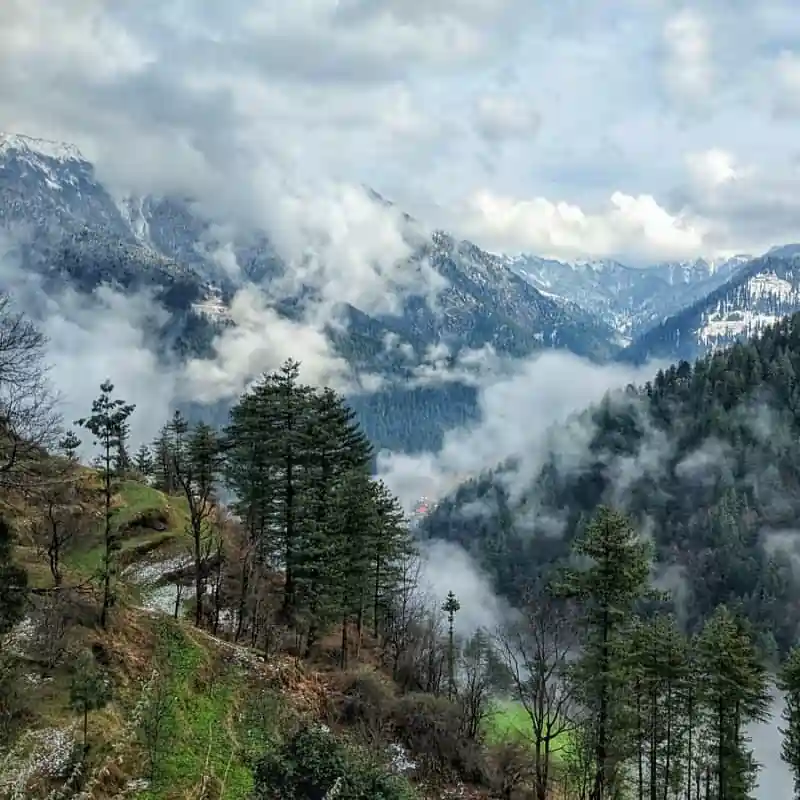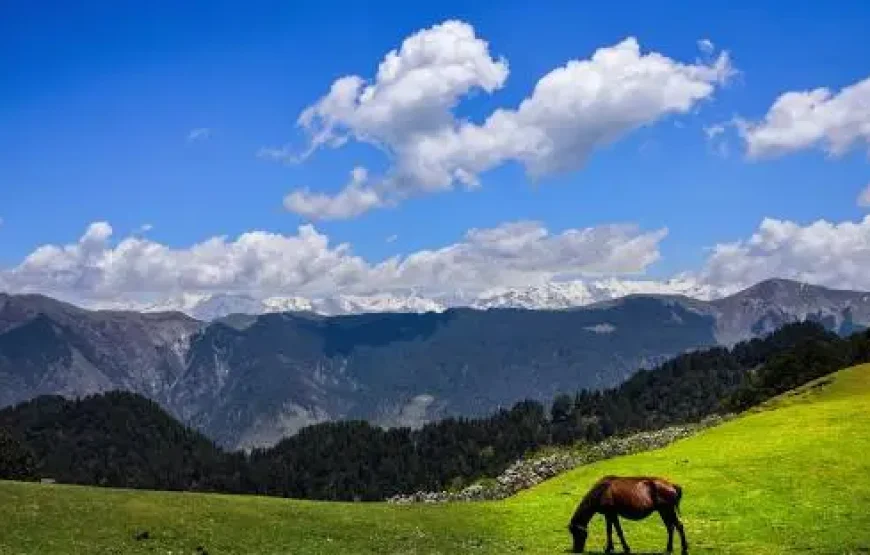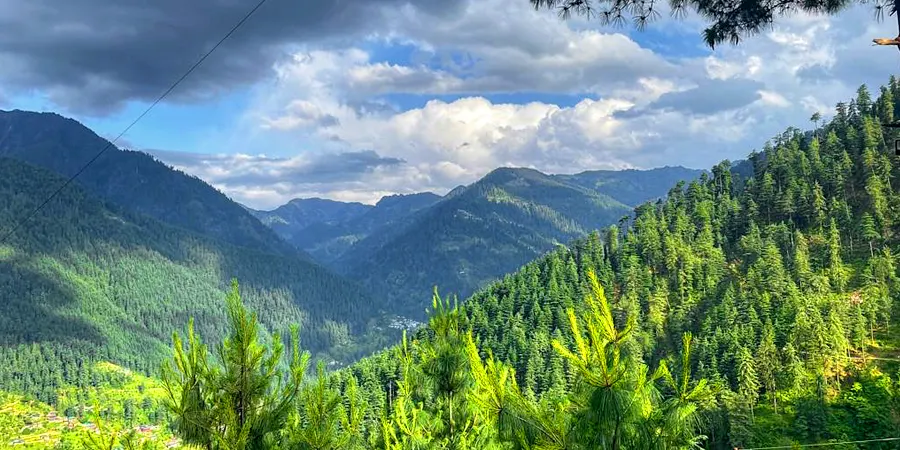Jibhi Weather / Climate
Published on October 24, 2025
Jibhi’s weather is one of the biggest reasons travelers fall in love with this peaceful Himalayan village. Every season here brings its own charm—misty mornings, cool breezes, and forests that change shades with time. Whether you crave snowy adventures or sunny days by the stream, choosing the right climate can make your Jibhi tour package even more memorable.
Mild summers invite nature walks and café views, monsoons turn the valley into a lush green paradise, and winters bring cozy stays with the chance of magical snowfall nearby. No matter when you visit, a well-planned Jibhi travel package ensures you enjoy comfort and scenic beauty at its best. And for couples seeking dreamy mountain moments wrapped in fresh pine air, a Jibhi holiday package offers the perfect escape—any month of the year.
Let’s explore Jibhi’s weather month-by-month so you can pick the season that matches your travel mood and dream experience!

Jibhi Weather Guide: Plan Your Perfect Himalayan Getaway
Dreaming of misty pine forests, quiet rivers, and cozy wooden cottages in the Himalayas? Jibhi—a hidden gem in Himachal Pradesh—is perfect for couples, solo travelers, and nature lovers alike. Whether you're booking a Jibhi honeymoon package, mapping out your Jibhi trip itinerary, or planning a peaceful Jibhi sightseeing tour, knowing the weather is key to a stress-free escape.
Here’s a simple, month-by-month guide to Jibhi’s weather—so you can pack right, plan smart, and fall in love with the mountains at the perfect time.
March – May: Spring Bliss
Weather: 10°C to 25°C – Pleasant days, cool nights
Best for: Honeymooners, photographers, nature walks
Why visit?
Flowers bloom, waterfalls gush, and the air smells fresh. This is the ideal time for a Jibhi honeymoon package—romantic, peaceful, and picture-perfect. Great for your Jibhi sightseeing tour (Tikker, Jalori Pass, Serolsar Lake) without the summer crowds.
June – August: Monsoon Magic
Weather: 15°C to 22°C – Lush greenery, frequent rain
Best for: Solitude seekers, writers, monsoon lovers
Note: Roads can get slippery. Check local updates before your Jibhi trip itinerary.
Why visit?
Everything turns emerald green! Waterfalls are at their peak. If you love rain-kissed mountains and cozy cabin stays, this is your season—but avoid heavy rain days for sightseeing.
September – November: Autumn Charm
Weather: 8°C to 20°C – Crisp air, clear skies
Best for: Families, trekkers, weekend getaways
Why visit?
Post-monsoon clarity means stunning mountain views. Perfect time for your Jibhi sightseeing tour—explore Bada Dev Temple, Chehni Kothi, and hike to Serolsar Lake. A great window for a relaxed Jibhi trip itinerary.
December – February: Winter Wonderland
Weather: -2°C to 12°C – Snowfall possible, especially in Jan
Best for: Snow lovers, couples wanting a quiet escape
Why visit?
Jibhi transforms into a snowy paradise! Book a Jibhi honeymoon package for a magical winter romance by the fireplace. Pack heavy woolens—roads may close during heavy snow, so confirm access before your Jibhi trip itinerary.
Jibhi Tour Packages & the Best Weather to Experience Them
Nestled in the quiet corners of Himachal Pradesh, Jibhi feels like a secret the mountains kept just for you. With its misty forests, gurgling rivers, and charming wooden cottages, it’s the perfect place to unwind—or get your heart pumping with adventure.
Whether you're dreaming of sleeping under the stars, hiking through pine-scented trails, or exploring hidden waterfalls, there’s a perfect plan for you:
- Jibhi camping package – for cozy nights by the fire
- Jibhi adventure tour – for thrill-seekers and explorers
- Jibhi trekking package – for those who love walking with a view
But timing matters! Here’s a simple month-by-month guide to help you pick the best time for your trip:
January – February
Cold, quiet, and magical
Temperatures drop near freezing, and you might even see light snow. Fewer tourists mean peaceful vibes—great for a quiet Jibhi camping package if you love crisp winter air and warm blankets. Roads are open, but pack heavy woolens!
March – April
Spring awakens
The snow melts, wildflowers bloom, and the weather turns mild (10°C–20°C). Perfect for a Jibhi trekking package—trails are dry, views are clear, and the forests come alive. Ideal for families and photographers.
May – June
Pleasant days, starry nights
Warm but not too hot (15°C–28°C). This is peak season for a Jibhi adventure tour—river walks, village hikes, and waterfall visits are at their best. Great time for camping too, with cool evenings and clear skies.
July – August
Monsoon magic (with caution)
Lush greenery everywhere—but heavy rain can cause landslides and slippery trails. Not ideal for Jibhi trekking packages or camping. If you love misty views and don’t mind staying indoors sometimes, it can be romantic—but travel with care.
September – October
Post-monsoon paradise
Rain fades, skies clear, and the air smells fresh. One of the best times to visit! Trails reopen, rivers sparkle, and temperatures are comfortable (12°C–24°C). Perfect for all three: camping, trekking, and adventure tours.
November – December
Crisp air and cozy vibes
Autumn colors give way to early winter chill. Days are sunny, nights get cold. Fewer crowds, peaceful stays, and magical sunsets over Jalori Pass. A Jibhi camping package with bonfire and hot soup

When to Go to Jibhi: A Month-by-Month Weather Guide
Jibhi is a peaceful little hill town in Himachal Pradesh—surrounded by thick forests, gurgling rivers, and fresh mountain air. But like all beautiful places in the hills, its weather changes a lot through the year. So, when’s the best time to visit?
Here’s a simple month-by-month guide to help you plan your perfect trip—whether you’re booking a Jibhi camping package, going on a Jibhi adventure tour, or trying a Jibhi trekking package.
January – February: Cold & Quiet
- Weather: Very cold (0°C to 10°C). Light snow is possible.
- What to expect: Few tourists, misty mornings, and cozy vibes.
- Best for: A peaceful Jibhi camping package (with warm sleeping bags!) or a quiet getaway.
- Tip: Roads are open, but pack heavy woolens and gloves.
March – April: Spring Arrives
- Weather: Mild and fresh (8°C to 20°C). Flowers start blooming.
- What to expect: Green forests, clear skies, and calm trails.
- Best for: Jibhi trekking package—Serolsar Lake and Jalori Pass are stunning now.
- Tip: Great time for families and photographers.
May – June: Sunny & Lively
- Weather: Warm days (15°C to 28°C), cool nights.
- What to expect: Long sunny days, buzzing cafes, and full rivers.
- Best for: Jibhi adventure tour (river walks, village hikes) and camping under stars.
- Tip: Book early—this is peak season!
July – August: Monsoon Magic (With Risks)
- Weather: Heavy rain, fog, and slippery paths.
- What to expect: Super green hills—but landslides can block roads.
- Best for: Not ideal for camping or trekking. Only visit if you love rain and don’t mind staying indoors.
- Tip: Avoid Jibhi trekking package during these months.
September – October: Post-Monsoon Bliss
- Weather: Fresh air, clear views, and comfy temps (12°C to 24°C).
- What to expect: Clean trails, flowing waterfalls, and blue skies.
- Best for: Everything! Perfect for camping, trekking, and adventure tours.
- Tip: October is one of the best months to visit Jibhi.
November – December: Crisp Air & Festive Feels
- Weather: Cool days, cold nights (2°C to 18°C). Frosty mornings.
- What to expect: Golden leaves, empty trails, and peaceful stays.
- Best for: Cozy Jibhi camping package with bonfires and hot soup.
- Tip: Great for couples or solo travelers looking for calm.

How to Reach Jibhi – Best Routes from Delhi, Chandigarh & Manali
Jibhi is well connected by road, but the nearest major transport hubs are in Delhi, Chandigarh, and Manali. Travelers can reach Jibhi by car, bus, or taxi. Planning the route in advance helps make the trip smooth and enjoyable, especially if you are opting for a Jibhi travel package or Jibhi tour package.
From Delhi:
-
Distance: Approximately 520 km (around 12–14 hours by road).
-
Route: Delhi → Ambala → Shimla → Aut → Jibhi.
-
Options: Private car, cab, or Volvo buses to Shimla/Aut, then taxi to Jibhi.
From Chandigarh:
-
Distance: Around 260 km (6–7 hours by road).
-
Route: Chandigarh → Bilaspur → Aut → Jibhi.
-
Options: Shared taxis, private cab, or local buses.
From Manali:
-
Distance: About 210 km (6–7 hours by road).
-
Route: Manali → Kullu → Aut → Jibhi.
-
Options: Taxi or self-drive; roads are scenic but hilly, so careful driving is needed.
Tips for Reaching Jibhi:
-
Roads are narrow in some areas, so plan travel during daylight hours.
-
Avoid night travel on hilly roads if unfamiliar with mountain driving.
-
Pre-book taxis or buses in advance, especially during peak seasons.
-
A Jibhi holiday package often includes pick-up and drop services, making travel hassle-free.
Visitors coming for adventure or trekking can combine their trip with nearby attractions like Jalori Pass or Serolsar Lake. Many travelers include Jibhi in a Jibhi Sightseeing Tour or Jibhi adventure tour, which ensures all major places are covered efficiently.
Choosing the right route depends on your starting point and travel preferences. A well-planned journey lets you enjoy the natural beauty of Himachal Pradesh while reaching Jibhi safely and comfortably.

Month-by-Month Climate of Jibhi: A Traveler’s Companion
Tucked away in the lush valleys of Himachal Pradesh, Jibhi isn’t just a destination—it’s a mood. With its wooden cottages, whispering pines, and the Tirthan River flowing gently below, it’s the perfect escape from city chaos. But to make the most of your trip, you need to know when to go—because Jibhi changes its clothes with every season.
Whether you're booking a Jibhi vacation package, hunting for a Jibhi budget tour package, planning a quick Jibhi weekend getaway, or just reading a Jibhi travel guide like this one—you’re in the right place. Let’s walk through the year, month by month, so you can pack smart and travel happy.
January – February: Winter Hush
Cold, calm, and dreamy
- Temp: 0°C to 10°C
- Vibe: Misty mornings, frost on rooftops, almost no crowds
- Perfect for: A quiet Jibhi weekend getaway with hot chai and mountain views
- Tip: A Jibhi budget tour package in winter often includes heated stays—great value!
March – April: Spring Awakens
Fresh air, blooming rhododendrons, sunny trails
- Temp: 8°C to 20°C
- Vibe: Nature wakes up—birds chirp, streams flow, forests turn green
- Perfect for: Your first Jibhi trekking trip or a relaxed Jibhi vacation package with family
- Tip: Trails to Serolsar Lake reopen—don’t miss them!
May – June: Sunny & Social
Long days, warm nights, buzzing energy
- Temp: 15°C to 28°C
- Vibe: Cafés open, campsites fill up, rivers glisten
- Perfect for: A fun Jibhi adventure tour or a romantic Jibhi weekend getaway
- Tip: Book early! This is peak season for all Jibhi vacation packages.
July – August: Monsoon Mystery
Lush green but slippery
- Temp: 14°C to 22°C
- Vibe: Everything’s green—but rain can block roads and trails
- Perfect for: Only if you love rain and cozy indoor stays
- Tip: Avoid trekking or camping. Not ideal for most Jibhi travel guide recommendations.
September – October: Golden Window
Clear skies, crisp air, perfect views
- Temp: 12°C to 24°C
- Vibe: Post-monsoon freshness—waterfalls full, trails dry, skies blue
- Perfect for: Everything! Great time for a Jibhi budget tour package or a full Jibhi vacation package
- Tip: October is arguably the best month to visit—don’t skip it!
November – December: Cozy & Quiet
Cool days, starry nights, festive feels
- Temp: 2°C to 18°C
- Vibe: Peaceful, fewer tourists, wood-burning stoves glowing
- Perfect for: A soul-refreshing Jibhi weekend getaway or a reflective solo trip
- Tip: Many Jibhi travel guide blogs call this the “hidden season”—underrated but magical.

Jibhi Packing List: What to Pack (and What to Skip) Based on the Weather
Jibhi’s weather changes fast—sunny mornings can turn into chilly evenings, and summer trails feel nothing like winter paths. Packing smart means more comfort, fewer worries, and better photos!
Below is a season-by-season guide on what to pack and what to skip—so you’re ready for your Jibhi camping package, Jibhi adventure tour, Jibhi trekking package, or peaceful Jibhi weekend getaway.
Spring (March – April)
Weather: 8°C – 20°C | Sunny days, cool nights, occasional light rain
Pack:
- Light woolens (fleece jacket, warm socks)
- Comfortable walking shoes or trekking sandals
- Light rain jacket or poncho
- Sunglasses & sunscreen (UV is strong at altitude!)
- Reusable water bottle
Skip:
- Heavy winter jackets
- Umbrellas (bulky—go for a compact raincoat instead)
- Flip-flops (not safe on forest trails)
Summer (May – June)
Weather: 15°C – 28°C | Warm days, cool nights, dry
Pack:
- Cotton clothes (t-shirts, light trousers)
- Light jacket or hoodie for evenings
- Trekking shoes with good grip
- Cap/hat & high-SPF sunscreen
- Mosquito repellent (especially near rivers)
Skip:
- Heavy boots or winter gear
- Dark-colored clothes (they absorb heat)
- Too many outfits—laundry is limited in villages
Monsoon (July – August)
Weather: 14°C – 22°C | Constant rain, fog, slippery paths
Pack:
- Quick-dry clothing (avoid cotton—it stays wet)
- Waterproof raincoat with hood
- Waterproof backpack cover
- Anti-skid shoes or gumboots
- Power bank (electricity can be unstable)
Skip:
- Canvas shoes or regular sneakers (they’ll get soaked)
- Expensive electronics without waterproof covers
- Camping gear (unless your Jibhi camping package provides monsoon-safe tents)
Autumn (September – October)
Weather: 12°C – 24°C | Crisp air, clear skies, cool nights
Pack:
- Layered clothing (t-shirt + sweater + light jacket)
- Trekking shoes (trails are dry and perfect)
- Scarf or light muffler for early mornings
- Camera (the views are unreal!)
- Reusable thermos for hot tea on trails
Skip:
- Heavy winter wear (too early for that)
- Rain gear (unless late September)
- Overpacking—this is the easiest season to travel light!
Winter (November – February)
Weather: 0°C – 15°C | Freezing nights, sunny days, possible light snow
Pack:
- Thermal innerwear
- Down jacket or heavy woolens
- Gloves, woolen cap, and scarf
- Warm socks (2–3 pairs)
- Hand warmers (great for camping or early treks)
- Insulated water bottle (water freezes overnight!)
Skip:
- Light jackets or fashion wear
- Open shoes or sandals
- Cotton clothes (they don’t retain warmth when damp)
Bonus Tips for Every Season:
- Always carry: Basic medicines, torch, power bank, and cash (ATMs are rare)
- For camping/trekking: Confirm with your Jibhi tour operator what’s included—many Jibhi camping packages provide tents, sleeping bags, and meals
- Eco-friendly choice: Avoid single-use plastic. Jibhi is pristine—let’s keep it that way!

Your Perfect Jibhi Moment Awaits—Packed Right, Planned Well
Jibhi doesn’t just welcome travelers—it whispers to souls. Whether you’re watching the first light kiss the peaks on a Jibhi Jalori Pass tour, sharing stories around a campfire under a sky full of stars, or sipping steaming chai in a wooden cottage as mist curls through the pines—this is where peace finds you.
And the best part? Getting here is easier than you think.With a well-planned Jibhi tour package from Delhi or a smooth, scenic Jibhi tour package from Chandigarh, your mountain dream begins the moment you step out your door. No stress, no guesswork—just pure, unhurried joy in the hills.
So don’t just go to Jibhi—go prepared, go light, and go with wonder. Because every trail you walk, every layer you wear, and every quiet moment at Jalori Pass will stitch itself into your story. Now that you know what to pack, when to go, and how to choose the perfect journey—all that’s left is to say yes.The mountains are calling.And whether you’re leaving from Delhi, Chandigarh, or somewhere in between…this time, you’re ready.
Frequently Asked Questions:
1. What is the best time to visit Jibhi?
The ideal months to visit Jibhi are from March to June and September to November. These periods offer pleasant weather, perfect for trekking, camping, and exploring the natural beauty of the region.
2. How can I reach Jibhi?
Jibhi is accessible by road from major cities like Delhi, Chandigarh, and Manali. The nearest railway station is Aut, approximately 60 km away, and the nearest airport is Bhuntar Airport, about 50 km from Jibhi.
3. Are there any trekking opportunities in Jibhi?
Yes, Jibhi offers several trekking routes, including the Jalori Pass trek, which provides panoramic views of the Dhauladhar and Pir Panjal ranges.
4. Can I go camping in Jibhi?
Absolutely! Jibhi is known for riverside camping experiences, especially near the Tirthan River. Many local campsites offer tents, meals, and guided activities.
5. Is Jibhi suitable for families?
Yes, Jibhi is family-friendly. Attractions like Jibhi Waterfall, Serolsar Lake, and Raghupur Fort are easily accessible and safe for children and elderly visitors.
6. What are the local cuisines to try in Jibhi?
Local Himachali dishes such as Siddu, Chana Madra, and Dham are popular. Local eateries and homestays serve authentic meals made with fresh, local ingredients.
7. Are there any cultural sites in Jibhi?
Yes, Chehni Kothi showcases traditional Himachali architecture. The Shringa Rishi Temple in Banjar Valley also offers spiritual experiences amidst scenic surroundings.
8. Can I fish in Jibhi?
Yes, the Tirthan River is popular for trout fishing. Visitors can fish independently or join guided tours.
9. Are there any wildlife sanctuaries near Jibhi?
Yes, the Great Himalayan National Park is nearby. It’s home to diverse flora and fauna and offers trekking and camping opportunities.
10. Is Jibhi a good destination for solo travelers?
Absolutely! Jibhi is serene, with welcoming locals, making it ideal for solo travelers seeking peace, nature, and adventure.




